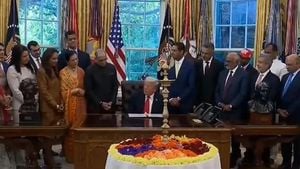The conversation surrounding privacy legislation has become increasingly polarized as states act individually to implement rules and regulations, leaving many to wonder about the future of online privacy as Congress struggles to establish national coherence.
Several states have risen to the challenge, enacting numerous laws aimed at bolstering protective measures for residents’ data. Notably, states such as New Hampshire, Nebraska, Delaware, Iowa, and New Jersey introduced laws at the start of the year to address issues related to data brokerage and corporate accountability for personal data safety.
Ray Brescia, who teaches at Albany Law School, remarked on this movement, noting, "It’s a slow drum beat of states starting to...protect citizens’ rights." He asserts this increasing state activity could lead to enhanced national privacy laws as local regulations set the stage for broader conversations.
Meanwhile, states like Florida, South Carolina, and Tennessee have enacted laws requiring age verification to access certain adult content online, which has fueled privacy concerns among many residents. The initiation of these laws coincided with heightened usage of virtual private networks (VPNs), with demand surging approximately 1,000% following Florida's enforcement of its regulations, as users sought to maintain anonymity online.
The issue of privacy is also being challenged at the highest level. Currently, the Texas law mandting age verification has made it to the Supreme Court, drawing criticism from various quarters. Groups within the adult entertainment industry and civil rights organizations argue these laws are invasive and infringe upon First Amendment rights. Statements from these groups encapsulate their concerns, asserting, "These age verification laws are invasive and violate the First Amendment right to free speech," highlighting the tension between regulatory efforts and personal freedoms.
This legal conflict showcases the difficulty lawmakers face when trying to strike balances between protecting citizens and upholding individual rights. Each state’s approach adds complexity to the national conversation about online privacy, as conflicting laws could easily create confusion for both businesses and consumers.
The push for privacy protection among the states may also signal to Congress the need for comprehensive national privacy legislation. California’s Consumer Privacy Act (CCPA) often serves as a model for states considering similar privacy protections. With numerous states drafting privacy legislation, the reluctance of Congress to react decisively may inspire greater autonomy among states to regulate technology as they see fit.
A cohesive national response is necessary. Experts, including Brescia, suggest there should be baseline legislative frameworks enabling uniform data privacy standards across the country. With technology constantly changing, the need for progressive and reactive privacy laws has never been more pressing.
With the current political climate characterized by rapid technological advancements outpacing legislative actions, the push for state-level regulations could eventually result in uniformity at the federal level. The consumer demand for privacy cannot be understated, and states are responding regardless of the challenges involved.
This developing patchwork of state laws allows residents significantly varied protections depending on their location yet has ignited debates about overreach and the need for aligned standards of privacy. Stakeholders from various sectors are now urging Congress to take decisive action to avoid leaving states to formulate solo solutions.
Despite the state-level advancements, the pathway for comprehensive federal privacy legislation remains uncertain. Companies operating across state lines face the burden of reconciling disparate regulations, which could stifle innovation and corporate growth.
The intersection of privacy legislation and technology continues to evolve, and whether congressional stasis can be broken remains to be seen. The push for change persists as states assert their regulatory power, but the outcome could reshape the nation’s approach to protecting personal data as we know it.



